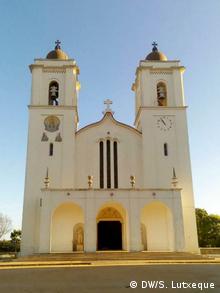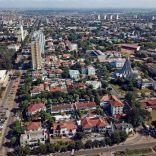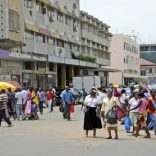Mozambique cuts rate to record low to aid recession economy
Watch: Obscure interests cause land conflicts in Mozambique, says Catholic Church

DW /Civil society agrees with Catholic bishops who criticize the usurpation of land for large projects. The government deflects criticism.
Land conflicts continue to divide the government, civil society and religious leaders, especially those linked to the Catholic Church, who say they have received many complaints from the public in recent years.
The Catholic bishops of Mozambique recently addressed a letter to communities and “people of good will” denouncing land grabs in the country, saying they felt that “Mozambique is in deep agony” over land problems.
“Conflicts over land are born of shady interests,” Father Cantifulas de Castro told DW Africa. “What good do these projects do the people?” he asks. “We must wake up from our sleep.”

It is mainly the political and economic elites who benefit from the use of land, Father Castro says.
“When we talk about industrialising agriculture [which occupies extensive areas], what will the small [citizen’s] gain from it?” he asks: “We must fight for the defence of our land and for the promotion of human rights.”
In Nampula province in northern Mozambique, there are many companies occupying large areas of land, Father Castro says. The indigenous residents were driven off their land without compensation.
“We are on a verge of death, it may not be a physical death, but the heart is feeling that we are becoming foreigners in our own land,” Father Castro says. “The people must not accept giving or handing over their land light heartedly.”
Eyes closed on laws in the name of interests
The lack of implementation and enforcement of legislation on land continues to present opportunities for political and governmental elites, says António Lagres of Solidarity Mozambique, a nongovernmental organisation that defends the rights of communities in Nampula.
“We have well-designed public policies and we have mechanisms to punish misdeeds, but what we are doing is closing our eyes so as not to enforce the laws, leaving room for people to do and undo,” Lagres says.
Authority refutes criticism
Provincial Director of Justice, Constitutional and Religious Affairs Bernardo Alide is cautious in commenting on the situation of loss of land by the communities.
Alide says the Mozambican government does not violate human rights nor support the usurpation of lands belonging to the communities.
“Laws defending of human rights already exist; it is only a matter of observing them. So I think that this pronouncement is not in line with what the community is experiencing. Nowadays, communities know what to do in relation to human rights,” Alide says.
The 2004 Constitution of the Republic of Mozambique states in article 109 that “land is owned by the State.” However, with the enormous discoveries of natural and mineral resources, communities continue to complain about the meagre benefits, especially for people who have had to leave their land for the implementation of resources mega-projects.












Leave a Reply
Be the First to Comment!
You must be logged in to post a comment.
You must be logged in to post a comment.